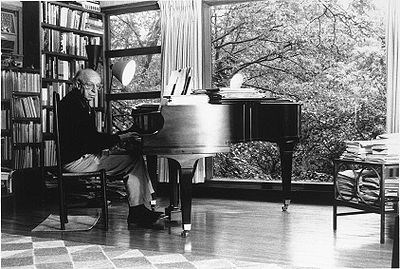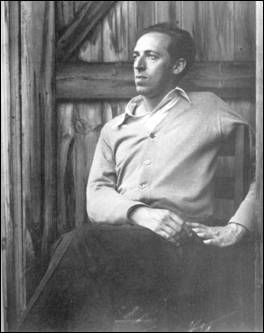Aaron Copland’s mission was to discover music that is entirely American. Throughout his lifetime he traced the steps of America since her infancy. He studied music along the East Coast, traveled to Paris to study, and he returned to the States, incessantly digging through our roots to find a simple, pure sound that could only be called American.
 |
| Copland composing at his piano (Absolute Astronomy http://www.absoluteastronomy.com) |
Today, countless listeners say that he succeeded. In his “Fanfare to the Common Man,” Copland captures the raw determination and glory of the American story, as written by the farmer, the slave, the settler, the Indian, the pilgrim, the immigrant, and individuals from all walks of life who struggled to make their place in America. Copland encountered his own obstacles in finding the sound he shares with America.
Copland was born in 1900 to a prosperous family of Jewish-Lithuanian immigrants. Throughout his life, Copland maintained his ancestral identity, but did not believe it was essential to his music. However, some critics, such as Daniel Gregory Mason, claimed that Copland, as a Jew, could not write music that shares the “poignant beauty of Anglo-Saxon sobriety and restraint” of American tradition, accusing Copland of being beholden to “the speciousness, the superficial charm and persuasiveness of Hebrew art…” To such accusations, Copland responded, “A man doesn’t create Art because he is a Jew, but because he is a Man.”
 |
| Copland, 1933 (Institute for Studies in American Music http://brooklyn.cuny.edu) |
Copland was also targeted by the hysteria of McCarthyism for the combined reasons of his Jewishness, Russian-Lithuanian parentage, homosexuality, his curious search for the American spirit, and his liberal political ideology. Copland was brought before the House Un-American Activities Committee on charges of communist affiliation, and was harassed for several years. Although inconvenienced, Copland did not pay it too much mind. “You see, I think it uses up a lot of energy to get really angry. And I save my energy [laugh] for moments where I think it’s really worth extending all that energy.” Throughout these episodes, fellow artists defended Copland, recognizing the love of America that drove him to write his music.
More than individual adversity, Copland was faced with the enormity of his goal. How could a single man capture the sight, wonder, expansiveness, pain, and struggle of an entire nation? How could he, a man from Brooklyn, New York, create a sound that solely and entirely belongs to America?
Copland’s key is simplicity and inclusiveness. The simple chords of a Copland piece result in the swelling of emotions in our breasts, and a peaceful calm of mind. His varied themes and styles all remain indicative, regardless of difference, of his goal: America.
Today as we listen to his music, we think of America as Copland envisioned it. But as much as his music is uniquely American, it is distinctly his. Like any person, Copland lived a life of success and challenge, and there is no better record of his life than his music. As Aaron Copland said, “An artist can take his personal sadness or his fear or his anger or his joy and crystallize it, giving it a life of its own. Thus he is released from his emotion as others cannot be. The arts offer the opportunity to do something that cannot be done anywhere else. It is the only place one can express in public the feelings ordinarily regarded as private. It is the place where a man or woman can be completely honest, where we can say whatever is in our hearts or minds, where we never need to hide from ourselves or from others.”
Page created on 1/21/2011 12:00:00 AM
Last edited 1/4/2021 3:20:54 PM
Pollack, Howard. Aaron Copland: the Life and Work of an Uncommon Man. New York: Henry Holt, 1999. 689
Masters, American. "Aaron Copland." [Online] Available http://www.pbs.org. 2005.
